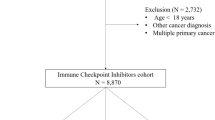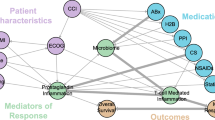Abstract
Purpose
Recent evidences support a role of gut microbiota in influencing the efficacy of immune checkpoint inhibitors (ICI). The use of antibiotics (ATB) and other concomitant medications may impair the balance of microbiota and negatively affect the efficacy of immunotherapy.
Methods
Retrospective data analysis was performed on advanced cancer patients treated with ICI. Those receiving ATB within 4 weeks before or after initiating ICI were compared with those who did not. Likewise, those who received ATB (irrespective of time of onset) were compared with not exposed and was calculated the variable “ATB exposure” (AE) defined as the % “days of ATB/days of ICI”. Use of proton pump inhibitors (PPIs), opioids and steroids was also evaluated.
Results
Of the 102 patients included, 60 (58.8%) received ATB during immunotherapy treatment (ATB+ group), and 33 (32.3%) received them between 4 weeks before or after starting ICI (ATB4+ group). Median AE of the ATB-treated patients was 11.1% (range 5.6–21.3). PFS and OS did not differ between ATB4+ and ATB4− group or between ATB+ group and not treated one. However, both PFS and OS were significantly lower in patients with a higher AE than the median one (3.1 vs. 8.2 months, p = 0.007; 9.4 vs. 17.8 months, p = 0.02, respectively). PPIs or steroids use did not affect clinical outcome of ICI but opioids use was significantly associated with lower PFS and OS (4.5 vs. 8.1 months, p = 0.010; 8.6 vs. 26.3 months, p < 0.001, respectively).
Conclusions
Cumulative ATB use, rather than simple use in a defined time frame, may impair the efficacy of immunotherapy. Opioids use was also associated with poorer outcomes in patients treated with ICI.




Similar content being viewed by others
Abbreviations
- AE:
-
Antibiotic exposure
- ATB:
-
Antibiotics
- ICI:
-
Immune checkpoint inhibitors
- PPIs:
-
Proton pump inhibitors
References
Holmes E, Li JV, Athanasiou T, et al. Understanding the role of gut microbiome-host metabolic signal disruption in health and disease. Trends Microbiol. 2011;19(7):349–59.
Feng Q, Chen WD, Wang YD, et al. Gut microbiota: an integral moderador in health and disease. Front Microbiol. 2018;9:151.
Schoeder B, Bäckhed F, et al. Signals from the gut microbiota to distant organs in physiology and disease. Nat Med. 2016;22(10):1079–89. https://doi.org/10.1038/nm.4185.
Garret W. Cancer and the microbiota. Science. 2015;348(6230):80–6. https://doi.org/10.1126/science.aaa4972.
Alexander JL, Wilson ID, Teare J, et al. Gut microbiota modulation of chemotherapy efficacy and toxicity. Nat Rev Gastroenterol Hepatol. 2017;14(6):356. https://doi.org/10.1038/nrgastro.2017.20.
Paulos CM, Wrzesinski C, Kaiser A, Hinrichs CS, Chieppa M, Cassard L, et al. Microbial translocation augments the function of adoptively transferred self/tumor-specific CD8+ T cells via TLR4 signaling. J Clin Invest. 2007;117(8):2197–204. https://doi.org/10.1172/JCI3220.
Viaud S, Saccheri F, Mignot G, Yamazaki T, Daillère R, Hannani D, et al. The intestinal microbiota modulates the anticancer immune effects of cyclophosphamide. Science. 2013;342:971–6.
Lida N, Dzutsev A, Stewart CA, Smith L, Bouladoux N, Weingarten RA, et al. Commensal bacteria control cancer response to therapy by modulating the tumor microenvironment. Science. 2013;342(6161):967–70. https://doi.org/10.1126/science.1240527.
Sivan A, Corrales L, Hubert N, Williams JB, Aquino-Michaels K, Earley ZM, et al. Commensal Bifidobacterium promotes antitumor immunity and facilitates anti-PD-L1 efficacy. Science. 2015;350(6264):1084–9. https://doi.org/10.1126/science.aac4255.
Vétizou M, Pitt JM, Daillère R, Lepage P, Waldschmitt N, Flament C, et al. Anticancer immunotherapy by CTLA-4 blockade relies on the gut microbiota. Science. 2015;350(6264):1079–84. https://doi.org/10.1126/science.aad1329.
Chaput N, Lepage P, Coutzac C, Soularue E, Le Roux K, Monot C, et al. Baseline gur microbiota predicts clinical response and colitis in metastasic melanoma patients treated with ipilimumab. Ann Oncol. 2017;28(6):1368–79. https://doi.org/10.1093/annonc/mdx108.
Frankel AE, Coughlin LA, Kim J, Froehlich TW, Xie Y, Frenkel EP, Koh AY. Metagenomic shotgun sequencing and unbiased metabolomic profiling identify specific human gut microbiota and metabolites associated with immune checkpoint therapy efficacy in melanoma patients. Neoplasia. 2017;19(10):848–55.
Gopalakrishnan V, Spencer CN, Nezi L, Reuben A, Andrews MC, Karpinets TV, et al. Gut microbiome modulates response to anti-PD-1 immunotherapy in melanoma patients. Science. 2018;359(6371):97–103. https://doi.org/10.1126/science.aan4236.
Matson V, Fessler J, Bao R, Chongsuwat T, Zha Y, Alegre ML, Luke JJ, Gajewski TF. The commensal microbiome is associated with anti-PD-1 efficacy in metastatic melanoma patients. Science. 2018;359(6371):104–8. https://doi.org/10.1126/science.aao3290.
Helmink BA, Khan MAW, Hermann A, Gopalakrishnan V, Wargo J. The microbiome, cancer and cancer therapy. Nat Med. 2019;25(3):377–88. https://doi.org/10.1038/s41591-019-0377-7.
Routy B, Le Chatelier E, Derosa L, Duong CPM, Alou MT, Daillere R, et al. Gut microbiome influences efficacy of PD-1-based immunotherapy against epithelial tumors. Science. 2018;359(6371):91–7. https://doi.org/10.1126/science.aan3706.
Derosa L, Hellmann MD, Spaziano M, Halpenny D, Fidelle M, Rivvi H, et al. Negative association of antibiotics on clinical activity of immune checkpoint inhibitors in patients with advanced renal cell and non-small-cell lung cancer. Ann Oncol. 2018;29(6):1437–44. https://doi.org/10.1093/annonc/mdy103.
Huemer F, Rinnerthaler G, Westphal T, Hackl H, Hutarew G, Gampenrieder S, et al. Impact of antibiotic treatment on immune-checkpoint blockade efficacy in advanced non-squamous non-small cell lung cancer. Oncotarget. 2018;9(23):16512–20. https://doi.org/10.18632/oncotarget.24751.
Derosa L, Routy B, Enot D, Baciarello G, Massard C, Loriot Y, et al. Impact of antibiotics on outcome in patients with metastatic reanal cell carcinoma treated with immune checkpoint inhibitors. J Clin Oncol. 2017;35(6_suppl):462.
Derosa L, Routy B, Mezquita L, Naltet C, Enot D, Fidelle M, et al. Antibiotics prescription to decrease progression-free survival (PFS) and overall surival (OS) in patients with advanced cancers treated with PD1/PDL1 immune checkpoint inhibitor. J Clin Oncol. 2017;35(15_suppl):3015.
Kim H, Kim I. Clinical association of antibiotics in immune check point inhibitors for advanced cancer treatment. Ann Oncol. 2018;29(suppl_9):ix170–2.
Tinsley N, Zhou C, Tan G, Rack S, Lorigan P, et al. Cumulative antibiotic use significantly decreases efficacy of checkpoint inhibitors in patients with advanced cancer. The Oncologist. 2019. https://doi.org/10.1634/theoncologist.2019-0160(Epub ahead of print).
Jakobsson HE, Jernberg C, Andersson AF, et al. Short-term antibiotic treatment has differing long-term impacts on the human throat and gut microbiome. PLoS ONE. 2010;5(3):e9836.
Kaderbai C, Richard C, Fumet JD, et al. Antibiotic use does not appear to influence response to nivolumab. Anticancer Res. 2017;37:3195–200.
Hakozaki T, Okuma Y, Omori M, et al. Impact of prior antibiotic use on the efficacy of nivolumab for non-small cell lung cancer. Oncol Lett. 2019;17:2946–52.
Eisenstein TK. Opioids and the immune system: What is their mechanism of action? Br J Pharmacol. 2011;164:1826–8. https://doi.org/10.1111/j.1476-5381.2011.01513.x.
Meng J, Yu H, Ma J, Wang J, Banerjee S, Charboneau R, Barke RA, Roy S. Morphine induces bacterial translocation in mice by compromising intestinal barrier function in a TLR-dependent manner. PLoS ONE. 2013;8(1):e54040. https://doi.org/10.1371/journal.pone.0054040.
Mora AL, Salazar M, Pablo-Caeiro J, Frost CP, et al. Moderate to high use of opioid analgesics are associated with an increased risk of Clostridium difficile infection. Am J Med Sci. 2012;343(4):27780. https://doi.org/10.1097/MAJ.0b013e31822f42eb.
Roy S, Ninkovic J, Banerjee S, Charboneau RG, Das S, et al. Opioid drug abuse and modulation of immune function: consequences in the susceptibility to opportunistic infections. J Neuroimmune Pharmacol. 2011;6(4):442–65. https://doi.org/10.1007/s11481-011-9292-5.
Zhan L, Meng J, Ban Y, Jalodia R, Chupikova I, et al. Morphine tolerance is attenuated in germfree mice and reversed by probiotics, implicating the role of gut microbiome. PNAS. 2019;116(27):13523–32. https://doi.org/10.1073/pnas.1901182116.
Acknowledgements
The author would like to thank Dr. Manuel Cobo Dols (Medical Oncology Department, Hospital Regional Universitario Málaga and IBIMA, Spain) for his suggestions on study protocol preparation and data collection and Andrés Blanco Hortas (Epidemiology Department, FIDIS, Hospital Lucus Augusti, Lugo, Spain) for his statistical help.
Funding
This research did not received any specific grant from funding agencies in the public, commercial, or not-for-profit sectors.
Author information
Authors and Affiliations
Corresponding author
Ethics declarations
Conflict of interest
The author declares no conflict of interest.
Ethical approval
The study protocol was approved by the Ethic Committee for Investigation with medicinal products of Galicia (Ref 2019/099) and has been performed in accordance with the ethical standards laid down in the Declaration of Helsinki and its later amendments.
Informed consent
Due to the retrospective nature of the study, written informed consent was not required. This paper does not contain any individual person’s data in any form.
Additional information
Publisher's Note
Springer Nature remains neutral with regard to jurisdictional claims in published maps and institutional affiliations.
Rights and permissions
About this article
Cite this article
Iglesias-Santamaría, A. Impact of antibiotic use and other concomitant medications on the efficacy of immune checkpoint inhibitors in patients with advanced cancer. Clin Transl Oncol 22, 1481–1490 (2020). https://doi.org/10.1007/s12094-019-02282-w
Received:
Accepted:
Published:
Issue Date:
DOI: https://doi.org/10.1007/s12094-019-02282-w




